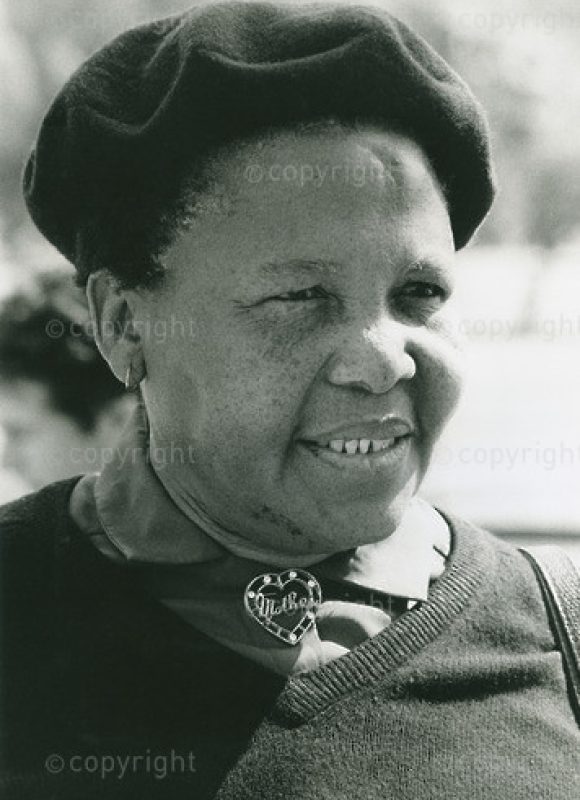PIONEER
Lydia Kompe (née Ngwenya)

Unionist | Land and Women’s Rights Activist | Politician
Born: 1935
“Although I am responsible for everyone, for all grievances of the community, I like to prioritise, and my priority lies with the empowerment of women..."
Who is
Lydia Kompe (née Ngwenya)?
After a long career of activism and community mobilisation, Kompe founded the Rural Women’s Movement in 1990.
Professions
and Roles
Politician, trade unionist, and rural land rights’ and gender activist.
Best Known For
Founder of the Rural Women’s Movement representing the rights of rural women in accessing land, fighting forced removals and evictions.
Life highlights
- Kompe was born in Matlala in the then Northern Province (now Limpopo). She grew up on a mission farm where her father was the regional deacon. The family lost access to ploughing land due to the Betterment Proclamation in the area in 1950, and their livelihoods were jeopardised.
- At the age of 15, after completing standard 7 (now grade 9), Kompe moved to Johannesburg for work. She struggled to find work due to repressive influx control laws, but eventually worked as a domestic worker in Hyde Park. She was arrested multiple times for protesting against the pass laws.
- Later, Kompe worked at the Heinemann Electric Factory outside Alexandra township, where she lived. Here she was recruited by the Metal and Allied Workers’ Union (MAWU – which would later become the National Union of Metal Workers of South Africa or NUMSA). She became more and more involved in the Union, and was recognised as an excellent recruiter and organiser, signing up more than 600 new workers.
- In 1976, she was elected as a shop steward. She organised a strike to show solidarity with the student movement of that year, and was fired. After her dismissal, MAWU hired her full time as an organiser.
- A year later, she is credited with starting a Transvaal branch of the Transport and General Workers Union (TGWU). Kompe remained a leader of TGWU until 1985.
- Kompe was integral in the establishment of both the Federation of South African Trade Unions in 1982 and the Congress of South African Trade Unions (COSATU) in 1985. In a space predominated by males, Kompe was repeatedly advocating for women’s issues like defending the rights of women night-cleaners.
- In 1985, Kompe became a full time organiser and fieldworker for the Transvaal Rural Action Committee (TRAC), which was established in 1983 by the Black Sash to defend the rights of rural people, particularly women.
- Drawing on her experience with TRAC, Kompe established the Rural Women’s Movement (RWM) with Sizani Ngubane in 1990 which mobilised over 500 existing women’s groups and lobbied specifically for women’s rights in rural areas. The RWM gave a voice to rural women, encouraged women’s participation in local government and traditional leadership, lobbied for access to land for women, legal advocacy and protested against forced removals and domestic violence. The RWM lobbied that traditional leadership would be subject to gender equality measures during the negotiation process leading up to 1994.
- In 1994, Kompe was elected as a Member of Parliament (MP) for the ANC, where she served on the Land Portfolio committee and the Agriculture Portfolio Committee until 1999. Kompe was an active member of the Status of Women Gender Committee, and she also participated in the drafting of the Land Restitution Act.
- Kompe remained committed to her roots in Limpopo, representing the constituency of Marble Hall in national and provincial legislatures until 2019.
IN THEIR OWN WORDS
“Although I am responsible for everyone, for all grievances of the community, I like to prioritise, and my priority lies with the empowerment of women. Rural women are the most disadvantaged people in our society. They are born and brought up in this system, in which women are regarded as inferior. It takes a long time, even if you explain the Constitution, for them to understand that they have rights.”
– Lydia Kompe, 2012
IN THE WORDS OF OTHERS
“Lydia Ngwenya-Komape could have opted for a life of servitude under oppressive rule against women. Instead, she confronted injustices with dignity. She is still active in promoting awareness concerning the plight of rural women. She remains an active member of the Water and Forestry Portfolio Committee. She also serves on the Status of Women and Gender Committee.”
– The Presidency on awarding the Order of Luthuli
